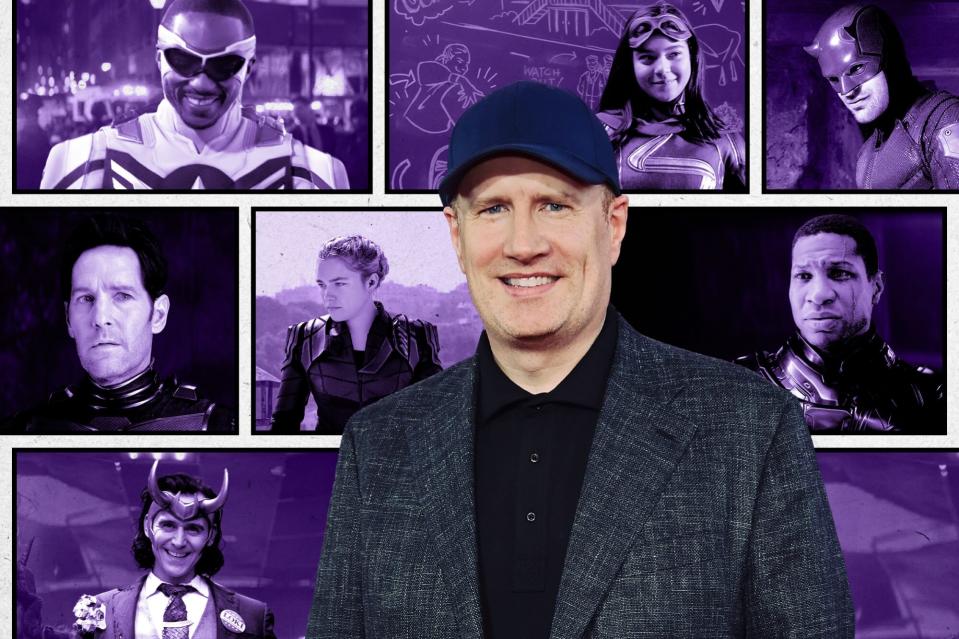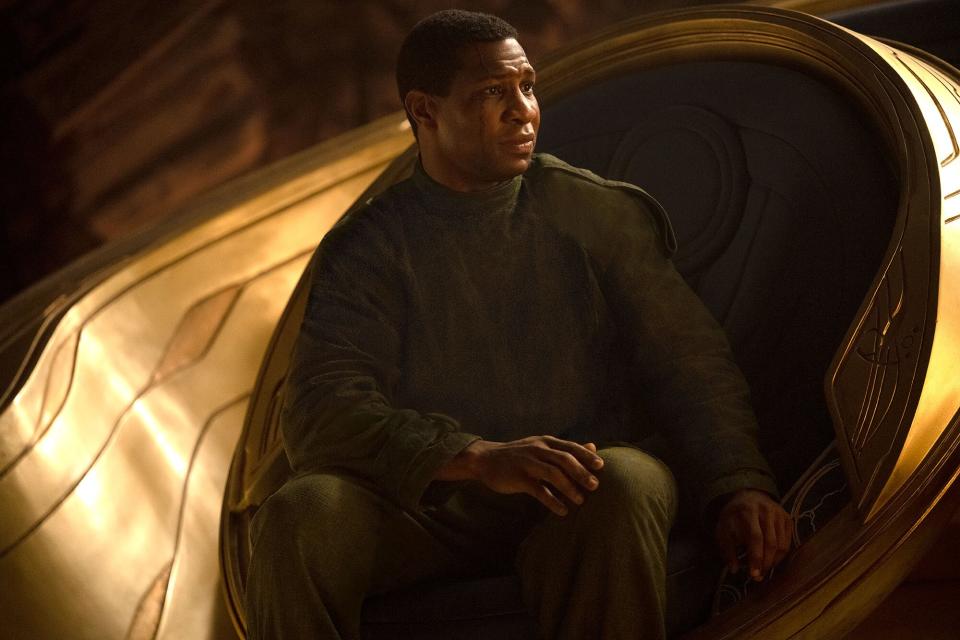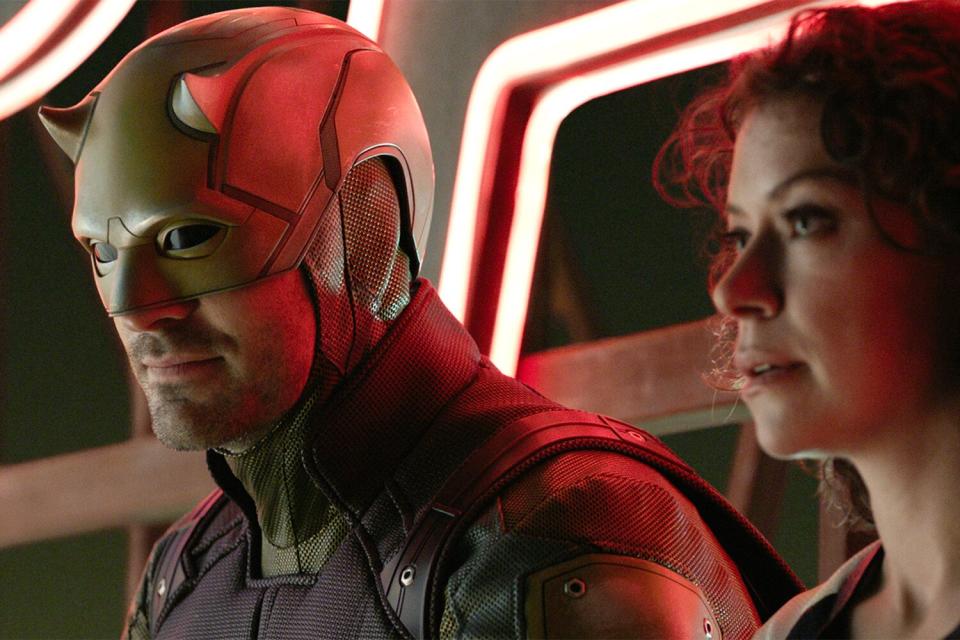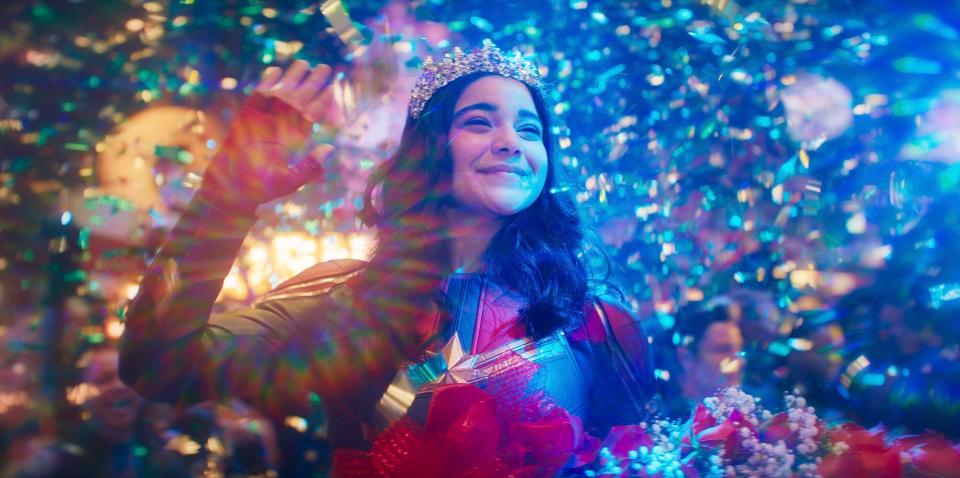Kevin Feige opens up about Phase 5, Kang, and the future of the MCU
- Oops!Something went wrong.Please try again later.
Welcome to Phase 5.
Avengers: Endgame proved to be anything but the end for the Marvel Cinematic Universe, and since then, the biggest superhero franchise in history has only continued to expand. After closing out the Infinity Saga in 2019 (and killing off a few of its marquee players), Marvel turned its attention to the multiverse, kicking off Phase 4 with a slew of films and Disney+ TV shows, including WandaVision, Shang-Chi and the Legend of the Ten Rings, and Black Panther: Wakanda Forever.
Now, Marvel is ready to begin its next chapter, and EW has your exclusive preview. When Ant-Man and the Wasp: Quantumania hits theaters Friday, it'll mark the beginning of Phase 5 — as well as the introduction of a new villain, Jonathan Majors' Kang the Conqueror. As part of our Quantumania cover story, EW sat down with Marvel's mastermind Kevin Feige for an exclusive in-depth interview, during which the notoriously cryptic studio president spilled details about Phase 4, Phase 5, and beyond. (And, of course, he was wearing a Quantumania baseball cap.)
Here, Feige, 49, teases Marvel's future plans, from the villainous Kang the Conqueror to the long-awaited introduction of the Fantastic Four.

Marvel / Getty Images Kevin Feige previews Marvel's Phase 5
ENTERTAINMENT WEEKLY: Let's start with Ant-Man. Why was Quantumania the right film to kick off Phase 5 and introduce Kang the Conqueror?
KEVIN FEIGE: We wanted to kick off Phase 5 with a team of heroes that you already know. We knew that if we were going to do another Ant-Man film, it was always the idea to spend the majority of time in the Quantum Realm, this place you've heard about in various movies and seen glimpses of. We wanted to actually explore it. When we were making the earlier films, we saw the visuals of the Quantum Realm, like, "See that back there? That's a city. See that over there? That's a whole civilization." We were hoping that one day we could explore more of it.
For years, we've always had the inkling that Kang would be an amazing follow-up to Thanos. He's got that equal stature in the comics, but he's a completely different villain. Mainly, that's because he's multiple villains. He's so unique from Thanos, which we really liked.
And in the early days of Quantumania [test audiences], Jonathan started to pop in a big way. He's the highest-testing villain we've ever had in any of our friends and families [screenings]. That's really saying something with a movie like this. Even early on without the effects, Jonathan is his own effect. He was working from the start. It's always one of the fun rolls of the dice that we do at Marvel, which is to say: "Hey, we're going to make multiple movies around this character, and we're going to start before the audience has even had a chance to meet him." We really go all in on these ideas and this casting. It was a big relief when the season ender of Loki season 1 happened. People really seem to be on board for Kang. People are chanting, "Kang!" when Jonathan goes on talk shows, and they haven't even seen him in the movie yet!
What was it about Jonathan Majors that made him the right fit for this? Like you said, he's playing multiple versions of this villain…
I mean, The Last Black Man in San Francisco was a huge reason we cast him. [Quantumania director] Peyton Reed was a proponent of Jonathan's from the very start. We knew we were casting him for at least Loki season 1 and Quantumania at the same time. Working with both the Loki team and Peyton and the Quantumania team, we thought Jonathan would be incredible for their different incarnations of those characters. And spoiler: He was. [Laughs]
I know that you're calling Phases 4, 5, and 6 the "Multiverse Saga," all leading up to 2025's Avengers: The Kang Dynasty and 2026's Secret Wars. How are you thinking about Phase 5 specifically? Is there a through-line or general theme?
It's really a classification system for the audience that's following along. It's to keep track of how the pieces fit in place. I didn't really talk a lot about the overarching themes or direction of Phase 4 until afterward — in large part because we are always adapting and weaving as creative demands and new ideas come up. But I would say in very generalized terms, as you see in Quantumania, it's about setting up the big overarching thread that will go through the next phases.
Not every film in the Infinity Saga focused on the Infinity Stones or Thanos, and it'll be the same across 5 and 6. But we're gearing up. People will get a taste of this in a big way in Quantumania as we lead to Avengers: Secret Wars, which I'm extremely excited for.
You know, I'm coming up on 23 years at Marvel. That's a long time. It's not quite half my life, but it's almost half my life. [Laughs] Many of us have been together for a decade or more. And we only do it because we are so excited and in love with the potential for what we can do ahead. The storylines that weave together through Phase 5 and 6 into Secret Wars and the opportunities that the multiverse brings storytelling-wise, it's a whole new aspect to the MCU.

Jay Maidment/Marvel Studios Jonathan Majors as Kang the Conqueror in 'Ant-Man and the Wasp: Quantumania'
Phase 4 was a transitional era. Several of your original cast members left after Endgame, and you introduced a whole new group of heroes. You also started to embrace television, launching multiple shows on Disney+. What were some of the learnings or takeaways from some of those projects?
I hope we learn something on every project. I was very pleased with everything that we did. Kamala Khan, for instance, is a great new character in the pantheon. I'm very proud of the Ms. Marvel show. I also know — and this is a spoiler — she essentially steals The Marvels, which is coming out [July 28]. It makes me excited that people will, I hope, see that movie and then go back and revisit those shows on Disney+. The fun thing about streaming is they are there forever, and people can keep re-exploring them. Moon Knight, same thing. I think there's a future for that character as we move forward.
SNL did a skit this week. Did you see it? The one about how many shows there are right now.
Yes!
I do think one of the powerful aspects of being at Marvel Studios is having these films and shows hit the zeitgeist. It is harder to hit the zeitgeist when there's so much product out there — and so much "content," as they say, which is a word that I hate. [Laughs] But we want Marvel Studios and the MCU projects to really stand out and stand above. So, people will see that as we get further into Phase 5 and 6. The pace at which we're putting out the Disney+ shows will change so they can each get a chance to shine.
So when you say the pace will change, do you mean spacing them out or putting out fewer shows a year?
Both, I think.
You talked about how you've been at Marvel for 23 years. It's been about 15 years since Iron Man, and Quantumania is movie No. 31.
31. Which is so weird because Baskin Robbins. They have 31 on everything. Weird, right?
That is weird! You should take credit for that. Say it was planned.
Right?
But I'm curious: As you continue to grow, does it ever start to get unwieldy? How do you balance telling stories for the hardcore nerds who have seen the past 30 movies, while also trying to find new audiences?
We've tried to make that our methodology since the start. If there's a Marvel Studios method — like there was a Marvel method in publishing — it's trying to do both. I've talked about this for years: If you want to dip in and out and just go to the movies on a Friday night or watch a streaming series, you can do that. And if you want to follow along, there's certainly much more to be discovered. But we don't ever want it to seem exclusive or that you need to have done your homework before watching something.
Now, I've also realized that a lot of people like to do the homework. A lot of people find the fun in the homework and the continuity and the connectivity. But it is a balance of always trying to do both.
She-Hulk, for example, was an experiment: "Let's just do a legal comedy." What if Ally McBeal was a superhero? How do we do a legal sitcom with an incredibly expensive CG character in the middle of every episode? And I couldn't be happier with the tone that Jessica Gao has set for that. It's a very different tone than many of other projects have, and that was totally intentional. I think when we are doing about eight projects a year — and again, I said this is going to shift a little bit — they all have to be different. They all have to stand apart and stand alone and be different from one another.
It's like when people go to the comic shops. There's Spider-Man and the Avengers and the big title ones. And sometimes you pick up a one-off or an experiment from an artist or writer that you're a fan of. That's why the comics have been around for 80-plus years, and I want Marvel Studios to be around that long, if not longer. So, we have to continue to do different types of things. Does everything have to appeal to everybody? It would be nice. But I think that's impossible. And if you try to do that, you're going to find yourself in such a small funnel and pipeline that things will get similar and boring and atrophy very, very quickly.

Marvel Studios Daredevil (Charlie Cox) and She-Hulk (Tatiana Maslany)
You talked about embracing television and how that was new territory for you. What were some of the biggest adjustments that came out of that?
I guess the learnings have been that you are rewarded creatively and by the audience by going to unexpected places. We always knew that to a certain extent, but it's fun to see. We want to do shows that can only be shows. I want to continue to make them even more episodic, which may seem counterintuitive. But I do think there is something fun about leaning back and watching an episode that can be relatively self-contained.
Lost was an incredibly influential show because it was this serialized story, which was not seen in television much. Now it's been how long, 20 years? Since then, almost everything has become like that. So now — and I think you're seeing this not just with our shows, but with many other shows — you're starting to see the fun of a self-contained, episodic story week to week. We're going to experiment with that in some of our upcoming things.
That's cool to hear. Nowadays, so many TV producers and showrunners like to pitch their shows as "eight-hour movies," but I think you're right: There's something special about a really great self-contained episode of television.
Yes. I mean, cliffhangers are great, and I like watching a show where you should go to bed, but you see the cliffhanger and you just have to watch the next episode. You certainly want to keep people engaged. But I'm a big Star Trek fan, and I still find it soothing to watch an episode of Next Gen with a beginning and an end. So, I think we're going to keep experimenting with that going forward.

Marvel Studios Iman Vellani as Kamala Khan in 'Ms. Marvel'
I'm curious: One of the big introductions in Phase 4 was mutants. Namor and Kamala Khan are both explicitly referred to as mutants. What can you tell us about how mutants — and the X-Men — may or not play into the future?
You know, I think we've said the word once. [Laughs] Kamala talks about a genetic mutation, and Namor refers to himself as a mutant amongst his own people. And mutant is a real genetic term, not just a comic book term.
But part of the fun is that I've been at this company for half my life, and we're just now tapping into arguably one of the biggest aspects of the publishing history. It's pretty remarkable, and it's a testament to the house of ideas and what Marvel publishing has done these 80 years. The question is how to do it and when to do it, and that's something we've been working on for years. Now we know. But we're not going to talk about it. [Laughs]
That's fair. But I'm curious what it's like for you to be thinking about mutants again, especially because you started your superhero career producing the X-Men movies.
It's amazing. And we've got Hugh Jackman coming back for our first Deadpool film within the MCU. That's our first R-rated film. To have Hugh come back is incredible. For me, personally, that is where I started. I remember sitting behind the camera — well behind the camera — at his audition for the film. It was his first on-set audition, and he flew up to Toronto to do a read with Anna Paquin. For him, and for me, and I think for all of the fans of Marvel, it's unbelievable what has happened in those 23 years. It's very full-circle having him come back in this new Deadpool film.
You've also got Guardians of the Galaxy Vol. 3 coming up, and James Gunn just took that big job at DC Studios. He tweeted that he spoke to you when he got the job. What was that conversation like?
It was not dissimilar to when we talked about him doing The Suicide Squad. I said, "That's awesome, and I can't wait to see it." I've never been shy about loving those characters. I had Superman posters all over my walls in my childhood bedroom, and I went to work for the Donners, [film producers] Richard Donner and Lauren Shuler Donner, because of Superman. The notion of those characters being in such good hands with James is exciting, and it's very cool — after he finishes Guardians of the Galaxy Vol. 3, of course. [Laughs]
So, I'd like to run through some of the other Phase 5 projects you have in the works and get some updates on them. Let's start with The Marvels, which you already mentioned. What can you tell us about the dynamic between Brie Larson's Carol, Iman Vellani's Kamala, and Teyonah Parris' Monica?
That's what the entire movie is about. There are fun cosmic elements to it. Marvel comic fans will recognize elements of the Kree-Skrull war. And it's picking up directly after the end of Captain Marvel 1, not in timeline but in story. We also do that in our upcoming Disney+ series Secret Invasion, and those are two very different follow-ups to that movie. Tonally, they couldn't be more different. But there's something immensely powerful about seeing Monica and Kamala and Carol together in a frame. To me, it's only akin to the first Avengers movie and seeing the six of them together in a frame. It's chill-inducing. They're so great together, and they all have different histories with one another.
The great thing about Kamala in her show, and now in this movie, is that she's not unlike Tom Holland's Peter Parker in Civil War. She can't believe she's with these other heroes, and can't believe that she finds herself in these places. And that's fun because we want to be that. I want to be that.
You've also got 2024's Captain America: New World Order with Anthony Mackie, and Harrison Ford is joining the fold as Thaddeus Ross. What can you tell us about his take on that character?
We start filming relatively soon. I'm sure anyone you've ever talked with about Harrison Ford says this, but it's unbelievable that we get to meet and talk with him and that he's embracing this role. He's tireless with the amount of work that he does. This is certainly a big part for Thaddeus Ross. He's the president of the United States in the film. And with Harrison, you think about Air Force One, and you think about some of his confrontations with the president in Clear and Present Danger. There's a dynamic between President Ross and Sam Wilson. They have a history together, but in this film, we'll be seeing the dynamic between Captain America and the president of the United States in a way that is just incredible.
This has been a dream for years, ever since Jon Favreau cast Harrison Ford in Cowboys and Aliens. I was always very jealous of that, so to have him finally in the MCU is just incredible. It's like, I can cross that off the wishlist.
Thunderbolts is also in the works for 2024, with a bunch of familiar faces.
That's another one. We've got a lot of things that start shooting relatively soon. What's fun about that, and I sort of said this at D23, is that they are barely heroes. None of them would consider themselves heroes. When your de facto leader is Bucky Barnes, that's sort of all you need to know. That's the trickle down. But again, it goes to the amazing work that [casting director] Sarah Finn has done across the whole MCU. You've got David Harbour and Florence Pugh and these people who are at the top of their game and popping in everything they're doing. They're already here and established in the MCU, and we get to build the movie around them.
You've also got the Blade movie with Mahershala Ali for next year. How's that going?
It's going well. Our director Yann [Demange] is down in Atlanta right now. Cameras roll in, like, the next 10 weeks or so.

Matt Kennedy/Columbia Pictures Tom Holland's Spider-Man and Benedict Cumberbatch's Doctor Strange in 'Spider-Man: No Way Home'
You mentioned Tom Holland's Peter Parker. Spider-Man: No Way Home was such a huge hit, and I know Marvel Studios has the deal with Sony regarding that character. Do you have any updates on when we might be seeing Peter Parker again?
All I will say is that we have the story. We have big ideas for that, and our writers are just putting pen to paper now.
Okay, one more: You brought Charlie Cox back as Daredevil, and now he's getting his own show on Disney+. What can you tell us about how his show fits into the MCU?
It's Charlie Cox and Vincent D'Onofrio, and they're amazing actors and storytellers in their own right. That's sort of what I was talking about with the fun of episodic television: That's really where we're experimenting with that, with Daredevil in particular.
You've got a lot of things in the works. We could be here all day. Are there any other projects we didn't talk about that you're particularly excited for?
Well, we talked a little bit about Secret Wars. We talked about Kang Dynasty as related to Quantumania. The only other one in terms of me personally and my 23-year history is the Fantastic Four. We sort of talked about mutants and that whole aspect to the Marvel world, but Fantastic Four is the foundation for everything that came after in the comics. There's certainly been versions of it [on screen], but never inhabiting the storytelling of the MCU. And that's something that is really exciting for us. People will start to hear more about that soon. We plan on that being a big pillar of the MCU going forward, just the way they've been in the comics for 50 or 60 years.
This interview has been edited for length and clarity.
Want more movie news? Sign up for Entertainment Weekly's free newsletter to get the latest trailers, celebrity interviews, film reviews, and more.
Related content:
Ant-Man and the Wasp: Quantumania trailer teases big trouble in the MCU

